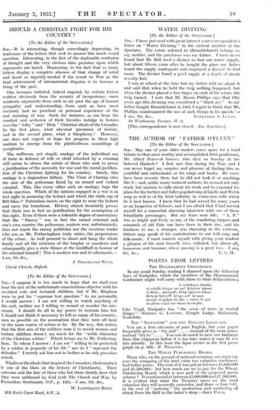SHOULD A CHRISTIAN FIGHT FOR HIS COUNTRY ?
[To the Editor of the SPECTATOR.] SIR,—It is interesting, though exceedingly depressing, to read some of the letters that seek to answer this much vexed question. Interesting, in the fact of the deplorable confusion of thought and the very obvious false premises upon which arguments are based. Depressing, in the fact that so many letters display a complete absence of that change of mind and heart so urgently needed if the resort to War as the final arbitrament of international disputes is to become a thing of the past.
One becomes irritated, indeed angered, by certain letters written obviously from the security of inexperience--mere academic arguments from such as are past the age of human sympathy and understanding—from such as have most certainly had no practical or personal experience of the real meaning of war. Such, for instance, as can from the comfort and seclusion of their firesides indulge in heroics over the " lofty " and Holy " Christian ideals of the Crusades. In the first place, what abysmal ignorance of history, and in the second place, what a blasphemy ! However, one does not expect or hope for progress in these high matters to emerge from the platitudinous mumblings of sycophants.
The wellworn, yet stupid, analogy of the individual use of force in defence of wife or child attacked by a criminal still seems to obsess the minds of those who seek to prove a justification of the necessity for war and the moral justifica- tion of the Christian fighting for his country. Surely, this- analogy is a stupendous fallacy. The Vicar of Charing cites the ease of the policeman faced by an armed and violent criminal. This, like every other such an analogy, begs the whole question. Which of the nations engaged in a war is in fact right in assuming the helmet and which the cloth cap of Bill Sikes ? Patriotism insists on the right to wear the helmet and carry the truncheon. History almost invariably proves that there was in fact no justification for the assumption of this right. Even if there were a tolerable degree of uncertainty that the " Enemy " was in fact the armed criminal and one's own country the policeman, modern war, unfortunately, does not touch the enemy politician nor the covetous trader who are, as Mr. Fotheringham truly states, the perpetrators of the crime. As well proceed to shoot and hang the whole family and all the relations of the burglar or nmrderer and subsequently give a state dinner at the Guildhall in honour of the criminal himself ! This is modern war and its aftermath.-- I am, Sir, &c., Christ Church, Oxford.
J. FR.ANELAND WEST.






































 Previous page
Previous page